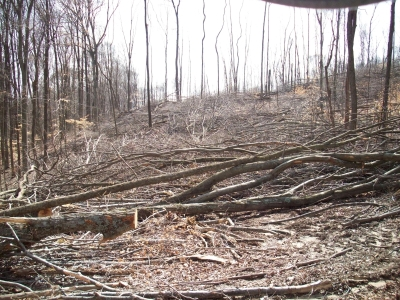Code
F06
Sector
Forest
The complete description of the NWRM
Summary
Continuous cover forestry is a broad range of forest management practices which may have some beneficial hydrological effects. The main idea behind continuous cover forestry is a reduction in the number or size of clear-cuts. Some definitions of continuous cover forestry state that no clear-cuts shall be larger than 0.25 ha. Continuous cover forestry ensures that there is an uninterrupted tree canopy and that the soil surface in never exposed. An uninterrupted tree canopy will have higher interception than a site with discontinuous tree cover. Ensuring that soils are never exposed will limit sediment production.
Illustration(s)
Possible benefits with level
| Benefits | Level |
|---|---|
|
BP1 - Store runoff
|
Medium
|
|
BP2 - Slow runoff
|
Medium
|
|
BP5 - Increase evapotranspiration
|
Low
|
|
BP6 - Increase infiltration and/or groundwater recharge
|
Low
|
|
BP7 - Increase soil water retention
|
Low
|
|
BP8 - Reduce pollutant sources
|
Medium
|
|
BP9 - Intercept pollution pathways
|
Medium
|
|
BP10 - Reduce erosion and/or sediment delivery
|
Medium
|
|
BP11 - Improve soils
|
Medium
|
|
BP14 - Create terrestrial habitats
|
Low
|
|
BP16 - Reduce peak temperature
|
Medium
|
|
BP17 - Absorb and/or retain CO2
|
Medium
|
|
ES1 - Water storage
|
Medium
|
|
ES2 - Fish stocks and recruiting
|
Low
|
|
ES3 - Natural biomass production
|
Medium
|
|
ES4 - Biodiversity preservation
|
High
|
|
ES5 - Climate change adaptation and mitigation
|
High
|
|
ES6 - Groundwater/aquifer recharge
|
Low
|
|
ES7 - Flood risk reduction
|
Medium
|
|
ES8 - Erosion/sediment control
|
Medium
|
|
ES9 - Filtration of pollutants
|
Medium
|
|
ES10 - Recreational opportunities
|
Medium
|
|
ES11 - Aesthetic/cultural value
|
Medium
|
|
PO1 - Improving status of biology quality elements
|
Low
|
|
PO2 - Improving status of physico-chemical quality elements
|
Low
|
|
PO4 - Improving chemical status and priority substances
|
Low
|
|
PO6 - Improving chemical status
|
Medium
|
|
PO7 - Prevent surface water status deterioration
|
Medium
|
|
PO8 - Prevent groundwater status deterioration
|
Medium
|
|
PO9 - Take adequate and co-ordinated measures to reduce flood risks
|
Low
|
|
PO10 - Protection of important habitats
|
Low
|
|
PO11 - Better protection for ecosystems and more use of Green Infrastructure
|
Medium
|
|
PO12 - More sustainable agriculture and forestry
|
Medium
|
|
PO14 - Prevention of biodiversity loss
|
High
|

